|
|
|
Sort Order |
|
|
|
Items / Page
|
|
|
|
|
|
|
| Srl | Item |
| 1 |
ID:
174015
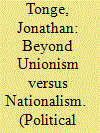

|
|
|
|
|
| Summary/Abstract |
Northern Ireland has always been a polity noted for its strong links between national identity, religion, and voting, and acute British unionist versus Irish nationalist divisions. The constitutional question of whether Northern Ireland should be part of the UK or a united Ireland dominates. Yet, recent surveys have suggested a sizeable and growing section of its electorate declares itself neither unionist nor nationalist. This development may have assisted the growth of the centrist Alliance Party, which rejects unionist and nationalist identities and claims to be neutral on Northern Ireland’s constitutional status. Alliance doubled its vote across three elections in 2019 and is now the third largest party in the region. This article examines the importance of ideological dealignment relative to other factors, such as Alliance’s opposition to Brexit, in explaining the rise of a non‐binary party in a divided society.
|
|
|
|
|
|
|
|
|
|
|
|
|
|
|
|
| 2 |
ID:
103543
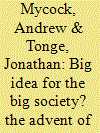

|
|
|
|
|
| Publication |
2011.
|
| Summary/Abstract |
The proposed introduction of National Citizen Service (NCS) by the Conservative party survived the negotiations with the Liberal Democrats and forms part of the coalition's policy agenda. The idea forms part of the concern of Cameronian Conservatives to create a big society, based primarily upon volunteering and civil engagement. Drawing upon comparisons with state and private sector-led models of citizen volunteering in Germany and the United States, this article explores the evolving rationale for the introduction of NCS and evaluates the issues and pitfalls which may arise.
|
|
|
|
|
|
|
|
|
|
|
|
|
|
|
|
| 3 |
ID:
120373
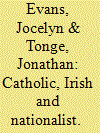

|
|
|
|
|
| Publication |
2013.
|
| Summary/Abstract |
Irish national identity, political nationalism and Catholicism are the defining characteristics of the minority community in Northern Ireland. These identifiable ethno-national and ethno-religious characteristics have been the basis of communal solidarity that has transcended increasing socio-economic heterogeneity within that community. Both of the Nationalist political parties in Northern Ireland, Sinn Féin and the Social Democratic and Labour Party (SDLP), draw their support almost exclusively from their community of origin. What is not known, however, is the relative importance of Irishness, Catholicism and Nationalism in shaping support for either party. Which of these ethnic identifiers is of greatest salience in identifying support for Sinn Féin or the SDLP? Drawing upon recent election survey evidence, this article attempts to rectify this information deficit, highlighting the weighting of components of ethnicity in determining intra-bloc political allegiances.
|
|
|
|
|
|
|
|
|
|
|
|
|
|
|
|
| 4 |
ID:
094863
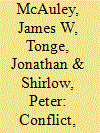

|
|
|
|
|
| Publication |
2010.
|
| Summary/Abstract |
Following the 1998 Belfast Agreement in Northern Ireland, levels of paramilitary violence have declined substantially. Among loyalists, the Ulster Volunteer Force (UVF) and associated Red Hand Commando (RHC) have formally renounced violence, and dissolved their 'military structures', and perhaps the most reticent of all of the major paramilitary groupings, the Ulster Defence Association (UDA), has taken on board the central tenets of conflict transformation, and 'stood down' all of its 'active service units' in the Ulster Freedom Fighters (UFF). Thus, paramilitary violence now is mainly confined to the activities of 'dissident' republican groups, notably the Real and Continuity IRAs, although low-level sectarian violence remains a problem.
Such dramatic societal and political change has resulted in a focus on the roles of formal party political leadership as agents of social change. This gaze, however, tends to obscure other important events such as the efforts, structures and approaches taken at the grassroots level to uphold and sustain conflict transformation and to maintain a reduction in violence. This article provides analysis of the role played by former loyalist paramilitary combatants in conflict transformation, and draws on material obtained through significant access to those former paramilitaries engaged in processes of societal shifts. In both personal and structural terms there is evidence of former combatants working to diminish the political tensions that remain as a result of the long-term inter-communal hostility developed across decades of violence and conflict.
|
|
|
|
|
|
|
|
|
|
|
|
|
|
|
|
| 5 |
ID:
149208
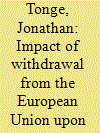

|
|
|
|
|
| Summary/Abstract |
As the only region containing a land frontier with a European Union from which the UK has chosen to depart, Northern Ireland will be particularly significantly affected by withdrawal. It is the prospect of the return of a ‘hard border’ partitioning the island of Ireland, not seen since the Troubles, which is perhaps of greatest concern. However, the status of the border is only one of several issues vexing Northern Ireland. This report concentrates upon the four most important: the lack of consent for withdrawal; the impact upon the Good Friday Agreement; the hardening of the border; and prospects for cross-border trade.
|
|
|
|
|
|
|
|
|
|
|
|
|
|
|
|
| 6 |
ID:
110762
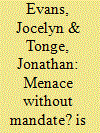

|
|
|
|
|
| Publication |
2012.
|
| Summary/Abstract |
Dissident Irish Republicans have increased their violent activities in recent years. These "spoilers" reject the 1998 Good Friday Agreement power-sharing deal between Unionist and Nationalist traditions in Northern Ireland. Instead dissident IRAs vow to maintain an armed campaign against Britain's sovereign claim to Northern Ireland and have killed British soldiers, police officers, and civilians in recent years. These groups have small political organisations with which they are associated. The assumption across the political spectrum is that, whereas Sinn Fein enjoyed significant electoral backing when linked to the now vanished Provisional IRA, contemporary violent Republican ultras and their political associates are utterly bereft of sympathy. Drawing upon new data from the Economic and Social Research Council 2010 Northern Ireland election survey, the first academic study to ask the electorate its views of dissident Republicans, this article examines whether there are any clusters of sympathy for these irreconcilables and their modus operandi. The piece assesses whether there are any demographic, structural, ideological, religious, or party trends indicating Republican dissident sympathies. It also assesses the extent to which dissidents are seen as a threat and examines whether this perception is shared evenly across Northern Ireland's two main communities.
|
|
|
|
|
|
|
|
|
|
|
|
|
|
|
|
| 7 |
ID:
112066
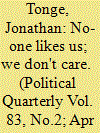

|
|
|
|
|
| Publication |
2012.
|
| Summary/Abstract |
The episodic dissident republican activity evident in Northern Ireland since the Good Friday Agreement has been accompanied by regular assertions from the police, politicians and commentators that dissidents have no backing. This article examines the historic importance of mandates and support for previous and contemporary republican armed campaigns. It explores whether violent republicans have ever enjoyed widespread support in Ireland and assesses the extent to which a lack of backing has precluded violent campaigns. The piece analyses the evidence regarding the lack of sympathy for current dissident violence, assessing the degree to which armed republicanism has reached a new level of isolation.
|
|
|
|
|
|
|
|
|
|
|
|
|
|
|
|
| 8 |
ID:
068577
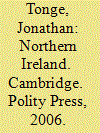

|
|
|
|
|
| Publication |
Cambridge, Polity Press, 2006.
|
| Description |
x, 259p.: table.Pbk
|
| Standard Number |
074563141X
|
|
|
|
|
|
|
|
|
|
|
|
Copies: C:1/I:0,R:0,Q:0
Circulation
| Accession# | Call# | Current Location | Status | Policy | Location |
| 051081 | 941.60824/TON 051081 | Main | On Shelf | General | |
|
|
|
|
| 9 |
ID:
165568
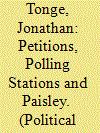

|
|
|
|
|
| Summary/Abstract |
The Recall of MPs Act 2015 allows constituents to petition for their MP to be unseated. A petition of recall is opened, for six weeks, if an MP has received a custodial sentence or been suspended from the House of Commons for ten or more sitting days. Should 10 per cent of constituents sign the petition, a by‐election is required, which the deposed MP has the right to contest. The first test of the Act came in 2018, when Ian Paisley, MP for North Antrim, was suspended from the Commons for thirty days. This article examines how the Act was implemented and assesses whether procedural oddities played any part in the petition failing to attract sufficient signatures to trigger a by‐election.
|
|
|
|
|
|
|
|
|
|
|
|
|
|
|
|
| 10 |
ID:
155411
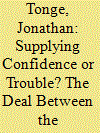

|
|
|
|
|
|
|
|